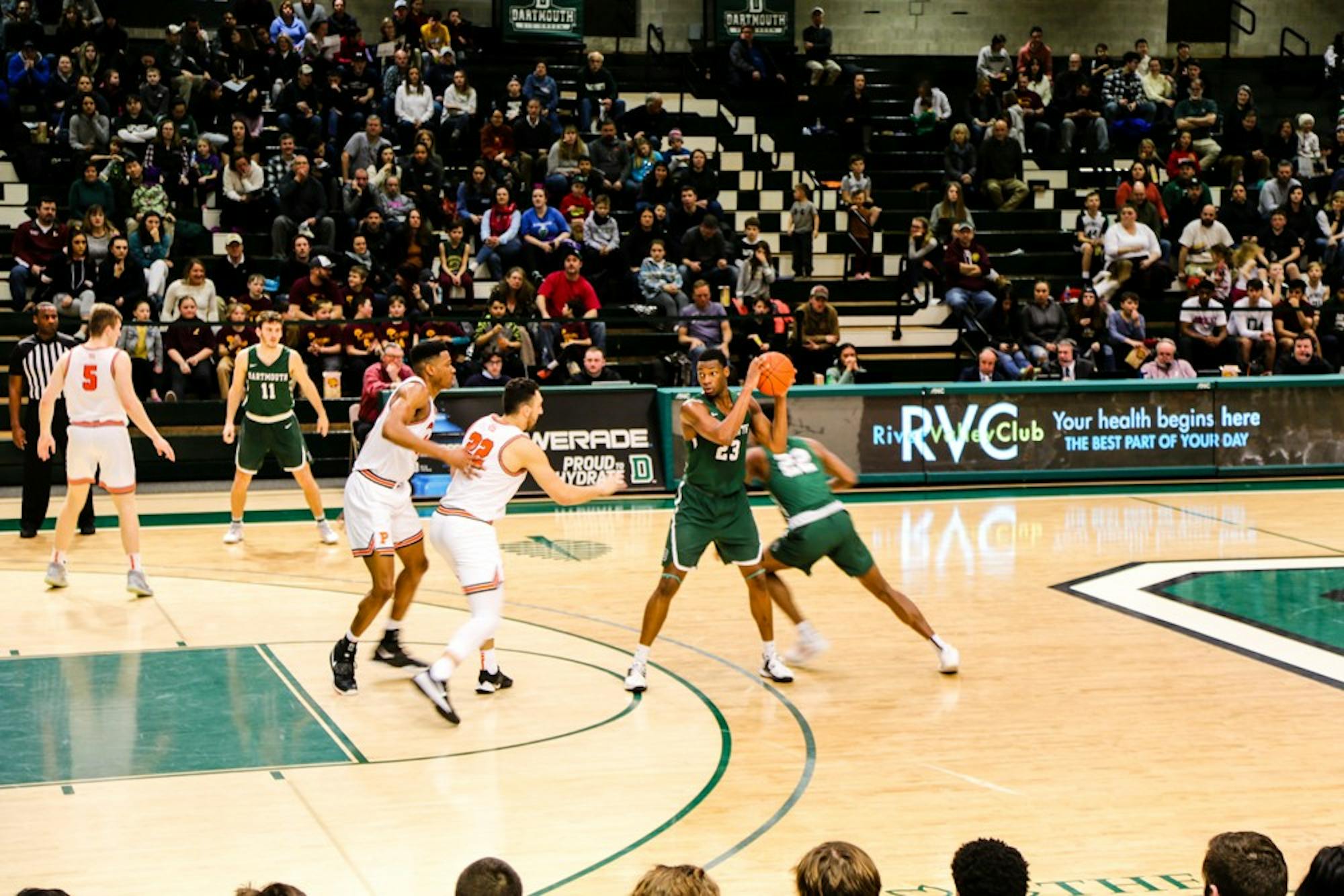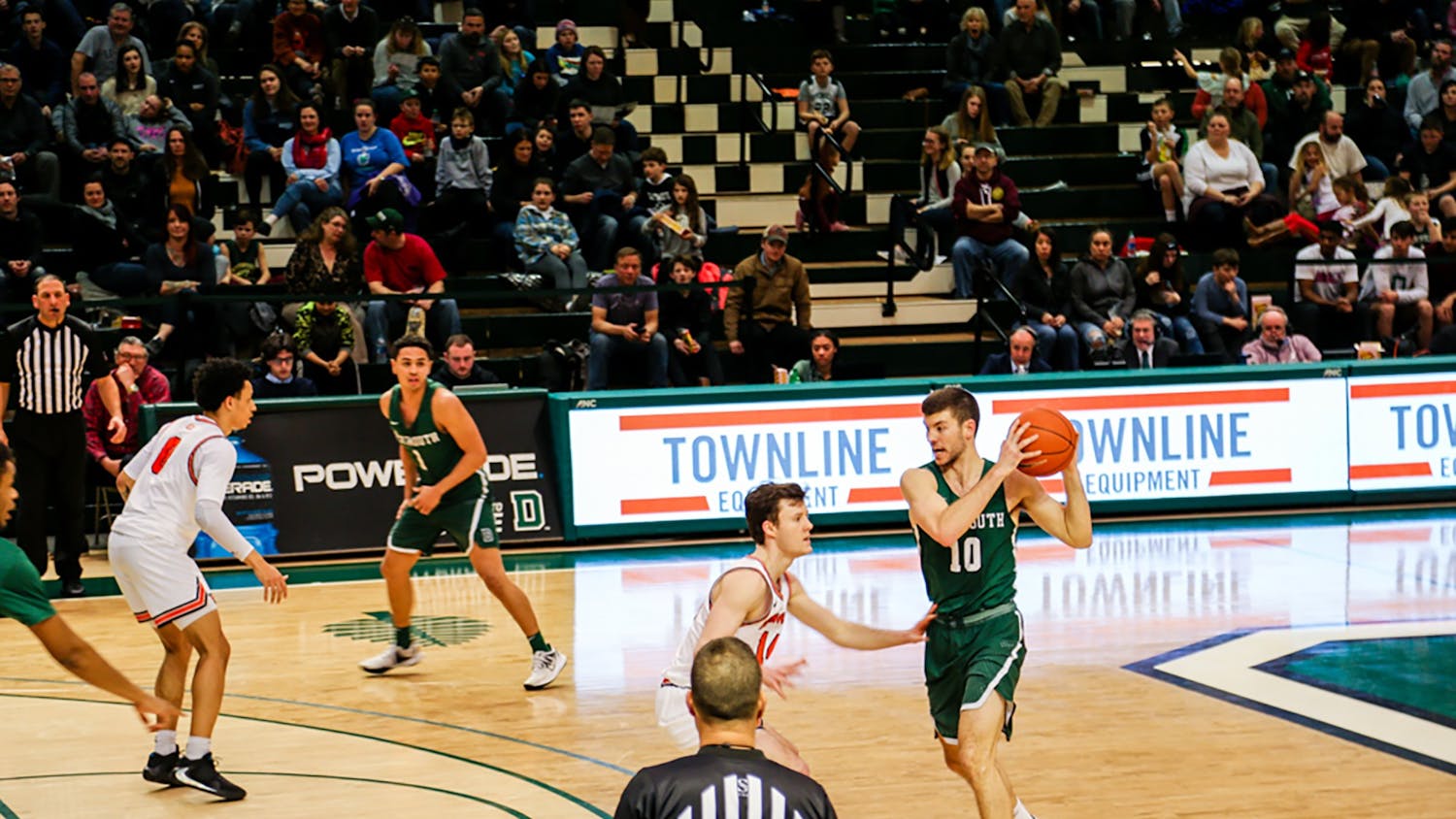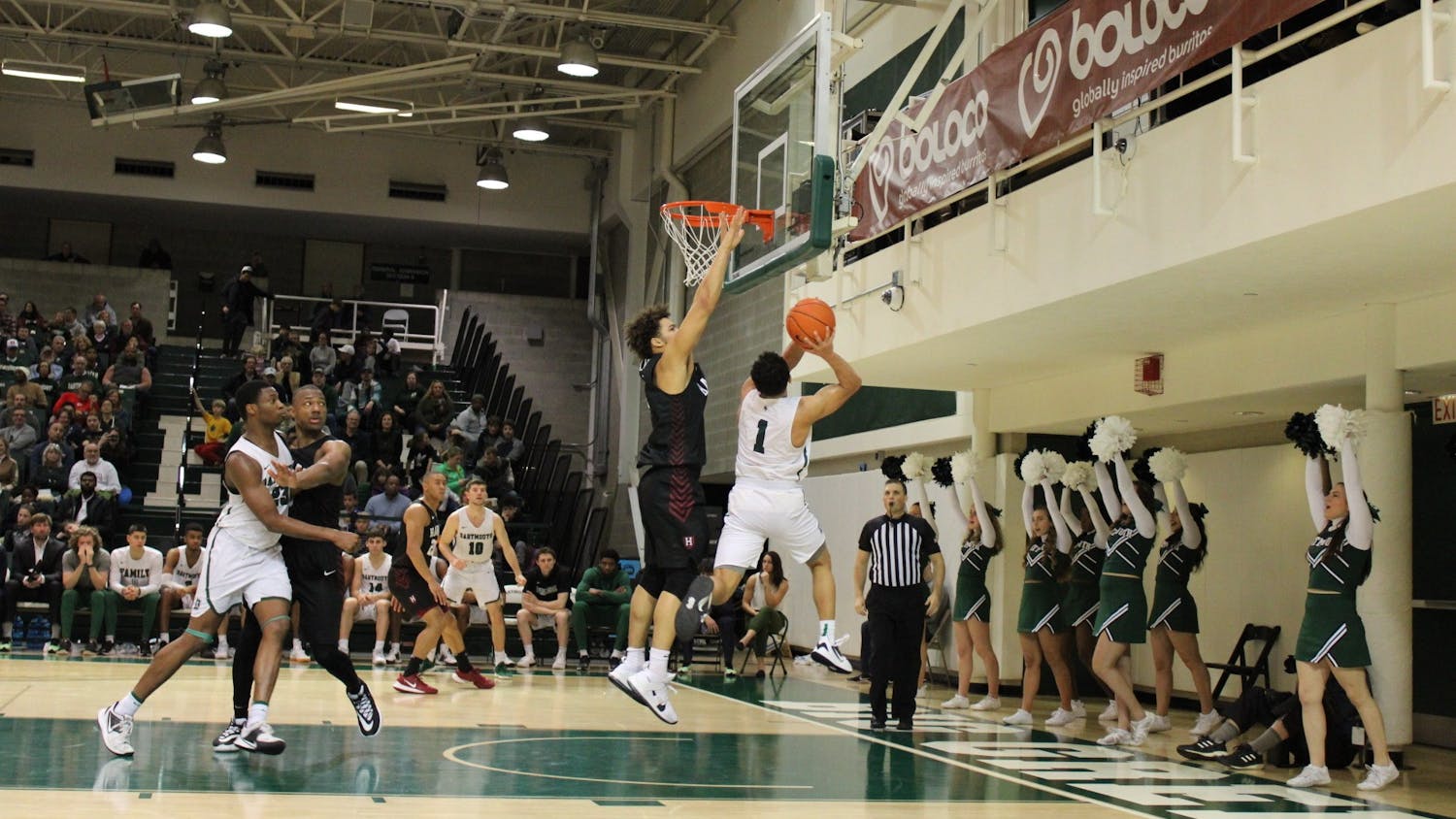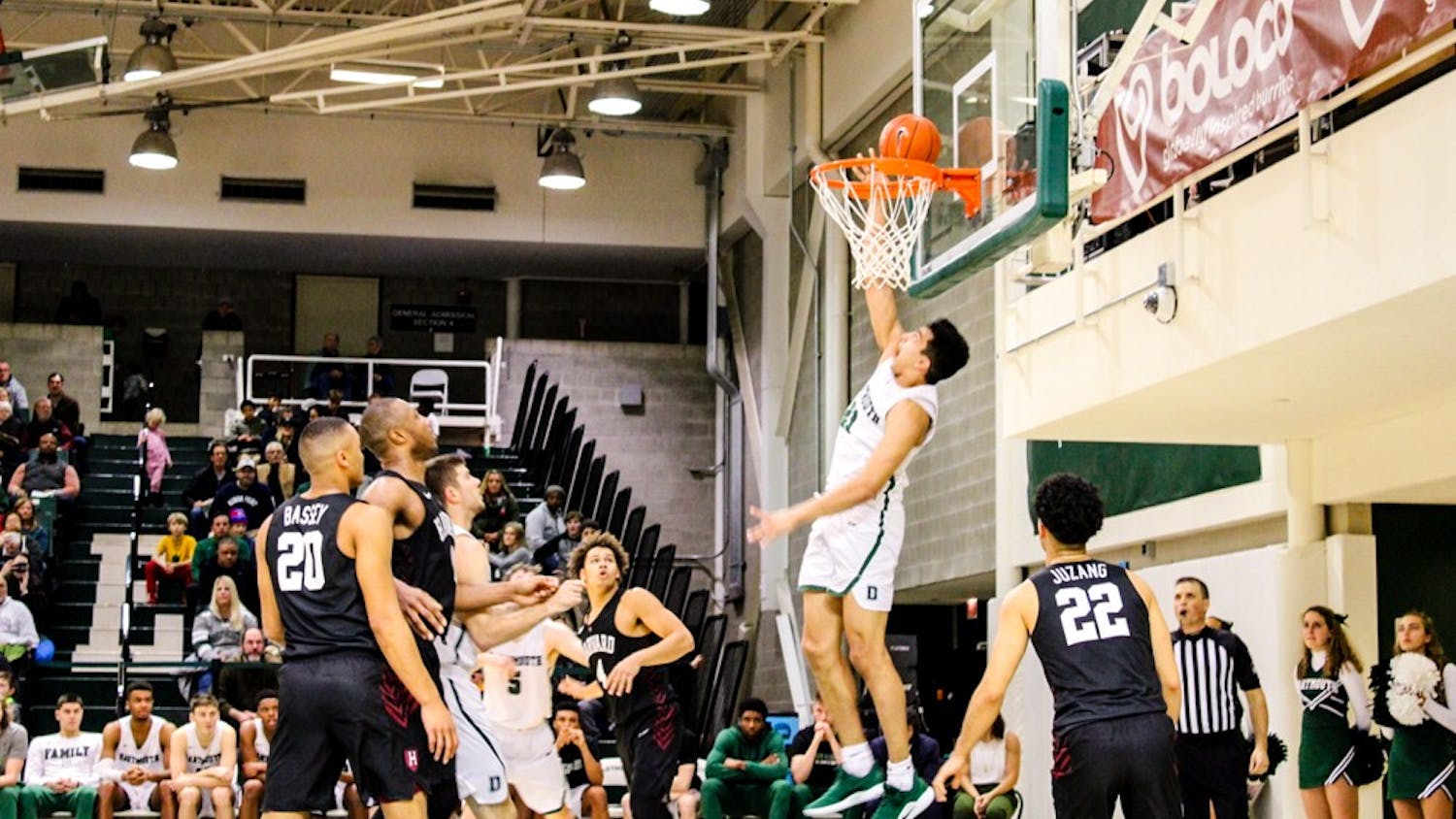This season, the typical Dartmouth basketball game went something like this: a hot start, a struggle in the middle, a furious comeback, a close loss. It is only fitting that the team’s season would follow the same arc.
The team’s 12-17 record — including 5-9 in Ivy League play — represents something of an improvement given its recent history. The 12 wins were the team’s most since 2014-15, and this season was just the seventh in this millennium to feature double-digit victories for the Big Green.
Aiding in this success was a much more effective defensive effort across the board. In a stark contrast to last year, this year’s version of the Big Green was much more efficient defensively, thanks to what James Foye ’20 referred to as a “pack line defensive scheme,” one that focused more on protecting the paint. According to college basketball statistician Ken Pomeroy’s rankings, the team’s adjusted points allowed per 100 possessions improved by eight points from last season.
“I challenged the guys at the beginning of the year,” head coach David McLaughlin said. “I said, ‘We have to become good enough defensively that no matter the time, the score, the situation in the game, when it’s time to get a stop, we have to be the type of team that can get a stop on command.’”
The defensive effort was clear from the Big Green’s first game, when the team held the University of Buffalo to just 63 points, the Bulls’ second-worst offensive output this season. The 68-63 Dartmouth victory was certainly a surprise, considering the Big Green beat a program coming off of back-to-back NCAA Tournament appearances. The team also snapped Buffalo’s 26-game home win streak.
“It’s a very hard place to win at, coupled with the fact that they beat us by what felt like 100 points last year,” Foye said. “Going into their place in a rematch and beating them was a great moment for our program and also just a great way to start the season.”
The win sparked a hot start to the year, with Dartmouth rolling to 5-1 after its first six contests, but things took a tumble from there. Arguably no loss was more heartbreaking than the one at Boston University, when the team nearly erased a late nine-point deficit, but instead went on to lose by a pair despite scoring 16 points in the final minute. The Terriers missed seven free throws in the last 90 seconds, a theme oddly common this year — Big Green opponents shot just 64.2 percent from the stripe, giving Dartmouth the third-best “free throw defense” in the country.
“When you’re consistently fouling the worst free throw shooters, that can bring percentages down,” Foye said. “I’d say that’s the one area where we do have a little bit of control, but besides that, I think it’s probably just a little bit of good fortune.”
The team sputtered into Ivy play after finishing its non-conference schedule with two wins in its last nine games. While the defense remained solid, the offense struggled, as the team’s overall year-to-year efficiency fell by about seven points per 100 possessions. Further, Dartmouth wasn’t helped by five road games in its first six Ivy contests, resulting in an 0-6 start to league play. A two-point loss at Brown University was particularly disappointing; the Big Green held an eight-point lead at the half and were still up by six with under 10 minutes to go before floundering down the stretch.
However, when the schedule softened, the wins finally started coming. The proverbial monkey was taken off the team’s back on Valentine’s Day, when an Aaryn Rai ’21 game-winning hook at the buzzer sent Columbia University packing. The game against the Lions featured an increased focus on Dartmouth’s three main scorers, Foye, Chris Knight ’21 and Rai. The trio took nearly 70 percent of the Big Green’s field goal attempts versus Columbia — their highest rate of the season.
The next night, the team completed its first Ivy sweep in five years with a win against Cornell University. The tournament race was on, with Dartmouth winning five of six to hang around in the Ivy standings. Even in this hot stretch, a second close loss loomed large: Against Princeton University, the Big Green overcame a 17-point first half deficit to come within one point on three different occasions. Dartmouth never made the basket to take the lead.
“We were kind of telling ourselves at every timeout, ‘They’re hot. They’re going to cool down. We’re going to come back,’” Foye said. “The comeback in the second half was definitely electric. We gave it everything we had.”
Knight, in particular, played the best basketball of his college career down the stretch, averaging 19.5 points, 8.1 rebounds and 2.8 assists in the team’s last eight games. He was named to the All-Ivy League Second Team for the second consecutive year. If Knight has another solid season this fall, he could become the first Dartmouth player to earn All-Ivy honors in three straight seasons since Shaun Gee ’00.
“It’s definitely going to be a great feeling,” Knight said. “I’m going to be able to go into games, just knowing that I’ve been able to prove myself in the league. It’s going to give me a lot of confidence.”
With Dartmouth finishing three games behind the University of Pennsylvania for the crucial fourth spot in the Ivy standings, the losses against Brown and Princeton did not cost Dartmouth a spot in the Ivy Tournament. But wins in those games would have given the Big Green a fighting chance heading into the final weekend, which may have yielded better results had Dartmouth truly been playing for an Ivy Tournament bid.
Although Dartmouth came up short at sixth in the conference, the Ivy League ultimately announced plans to shutter its postseason tournament altogether in response to the COVID-19 pandemic. Foye said he has often thought about how he would have reacted had Dartmouth clinched a spot.
“I would probably be angry, devastated, all those [emotions],” Foye said. “And then, you’re feeling like, ‘That feels extreme. Let’s just play it without fans.’ Then all Ivy League sports get canceled, NCAA, NBA, the ball gets rolling ... It seems like the Ivy League was really ahead of the curve in making the right decision, so I think that would make it easier to swallow.”
McLaughlin referenced the limited closure the team got in its last meeting before Dartmouth closed its doors for spring term.
“We weren’t where we are now as a country, so we didn’t know [what would happen],” McLaughlin said. “I knew there was a chance that we might not be doing this again for a long time. So we did have something like that, but because everything was so fluid at that point, I probably didn’t say enough wholeheartedly or mean it because we didn’t know what was going to happen.”
Now, the team turns its attention to next season. Luckily for Dartmouth, three of the regular starting five — Knight, Rai and Taurus Samuels ’22 — will return, as will Brendan Barry ’20, who entered the transfer portal but ultimately decided to postpone his graduation and return for his final season. The team will miss veterans Foye and Ian Sistare ’20, its graduating starters, on and off the floor.
“First and foremost, you talk about their leadership and presence, and, you know, those aren’t easy voids to fill,” McLaughlin said. “That stuff is there every day. They set the bar very high.”
Another impactful player off the bench, Trevon Ary-Turner ’21, could also be departing, as he has reportedly entered the transfer portal. With many decisions to make ahead, McLaughlin did not specify who could be in position to take those spots in the lineup, although this discussion took place before news broke of Barry’s return. Still, this effectively leaves one starting spot wide open.
“This isn’t, ‘He leaves, I automatically slide in because I was the guy who played behind him in the game,’” McLaughlin said. “No. I want it to be just the opposite. I want a guy who maybe got very limited minutes to say, ‘I’m taking that guy’s spot. I’m glad that there’s opportunity because I’m attacking it. I’m not attacking it to be his backup.’ That’s how we want our guys working.”
The work in preparation for next season has already begun, albeit remotely. According to Knight, the team has been participating in weekly Zoom check-ins with the coaching staff, which has also assigned players workouts to complete at home. It may be unorthodox, but this is how Dartmouth is hoping to start its path toward its first winning season in over 20 years.





